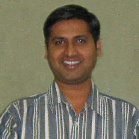
Ajay Kumar
Work place: Department of Computer Science, Jaypee University of Engineering and Technology, Guna, 473226 - INDIA
E-mail: ajaymits@gmail.com
Website:
Research Interests: Computer systems and computational processes, Computer Architecture and Organization, Computer Networks, Data Structures and Algorithms
Biography
Ajay Kumar received the B.Tech degree in Information Technology from M.I.E.T., Meerut in 2002. He has also done Advance Diploma in "Network Planning and Administration" from CEDTT Mohali (C-DAC, Mohali). He has completed his M.E. from M.I.T.S. Gwalior in 2005. His M.E. thesis title was "Design and Analysis of a Data-Mining Tool". Before joining JUET, Guna, he worked as a Sr. lecturer (Computer Science) in S.I.E.T. Meerut. His area of Interest includes Data-Mining, Computer Networking, and Operating System.
Author Articles
Density Based Initialization Method for K-Means Clustering Algorithm
DOI: https://doi.org/10.5815/ijisa.2017.10.05, Pub. Date: 8 Oct. 2017
Data clustering is a basic technique to show the structure of a data set. K-means clustering is a widely acceptable method of data clustering, which follow a partitioned approach for dividing the given data set into non-overlapping groups. Unfortunately, it has the pitfall of randomly choosing the initial cluster centers. Due to its gradient nature, this algorithm is highly sensitive to the initial seed value. In this paper, we propose a kernel density-based method to compute an initial seed value for the k-means algorithm. The idea is to select an initial point from the denser region because they truly reflect the property of the overall data set. Subsequently, we are avoiding the selection of outliers as an initial seed value. We have verified the proposed method on real data sets with the help of different internal and external validity measures. The experimental analysis illustrates that the proposed method has better performance over the k-means, k-means++ algorithm, and other recent initialization methods.
[...] Read more.Other Articles
Subscribe to receive issue release notifications and newsletters from MECS Press journals